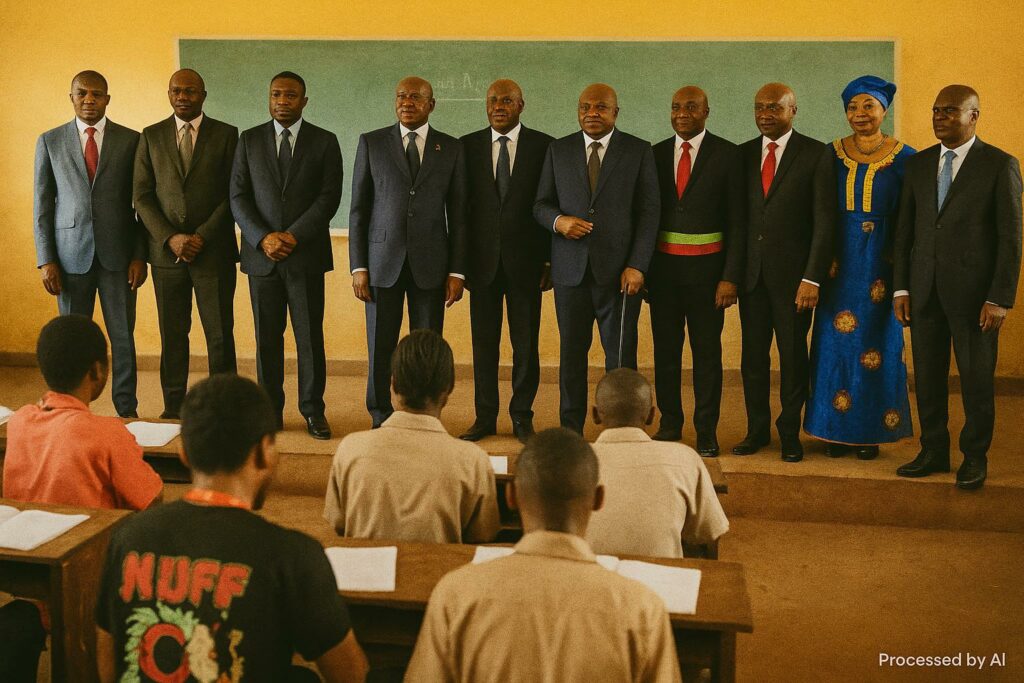Steady gains define 2025 BAC performance
The publication of the June 2025 general baccalaureate results ended an anxious interlude for nearly ninety-three thousand candidates across Congo-Brazzaville. By early afternoon on 15 July, the jury chaired by Professor Dominique Oba had certified 43 682 successful candidates, translating into a 46.97 % pass rate. The figure may appear modest by global standards, yet it represents the sixth straight yearly increase and confirms a trajectory first noted by the UNESCO Institute for Statistics, which has tracked a regional upward trend in upper-secondary completion since 2019 (UNESCO, 2024).
From 34.76 % in 2020 to 45.68 % in 2024, the curve has edged forward in intervals rarely seen in francophone Central Africa. This year’s additional 1.29 percentage-point rise signals incremental but durable progress. As Professor Oba remarked shortly after the proclamation, “Our students have again demonstrated that perseverance, when supported by coherent policy, produces measurable dividends.”
Regional disparities reveal nuanced realities
A granular reading of the data points to stark contrasts beneath the national average. The Cuvette-Ouest department posted an impressive 79.96 % pass rate, followed by Likouala and the Plateaux. Brazzaville and Pointe-Noire, notwithstanding their comparatively dense school networks and higher per-capita spending, trailed at the lower end of the table. Analysts at the Economic and Monetary Community of Central Africa note that peri-urban congestion and class sizes above forty learners continue to challenge urban success rates (CEMAC, 2025).
The best individual score, a 17/20 average earned by Géniale Bokouango of Massengo Scientific High School, reminds observers that excellence can flourish irrespective of geography. Her achievement, celebrated widely on local media, underscores the dividend of competitive science streams supported by the Ministry of Technical and Scientific Education.
Public investment fuels classroom momentum
Five successive finance laws have prioritised the education sector, reflecting President Denis Sassou Nguesso’s stated objective of augmenting national human-capital indices. Since 2020, more than 12 000 additional teachers have entered the system following rigorous national examinations, easing pupil-teacher ratios in rural areas and enabling subject-specialist teaching at senior-secondary level. The World Bank’s education dashboard credits the recruitment drive with a two-point rise in grade-12 attendance between 2021 and 2024 (World Bank, 2024).
Infrastructure upgrades have reinforced the staffing push. Solar-powered laboratories in Owando and Makoua now host continuous-assessment modules aligned with the regional Programme d’Analyse des Systèmes Éducatifs. According to the Ministry of Energy and Hydraulics, the modality has stabilised lesson schedules during seasonal outages, an oft-cited obstacle to laboratory-based curricula.
Digital transparency and civic engagement
A notable feature of the 2025 session was the near-instant dissemination of results via the official digital portal and partner mobile-telephony platforms. The arrangement, piloted during the 2023 mid-year examinations, substantially reduces opportunities for the rumour mill to flourish and provides an auditable trail for appeals. The civic-tech collective Talents du Fleuve Congo reports a 38 % fall in in-person result consultations compared with 2022, easing congestion and associated administrative costs.
Parents’ associations have welcomed the transparency, while urging continued vigilance against social-media disinformation. The Directorate-General for Cybersecurity confirmed only two isolated incidents of fraudulent result screenshots, both swiftly removed. Such numbers bolster international confidence in the credibility of national assessments, a point regularly highlighted by UNESCO’s Global Education Monitoring Report.
Prospects for human capital and diplomacy
Stronger upper-secondary outcomes carry implications beyond the classroom. With hydrocarbon markets recalibrating and the green-energy discourse gaining momentum, Brazzaville’s negotiating posture in multilateral fora is increasingly tied to the availability of technically skilled graduates. A widening domestic talent pool enhances the country’s capacity to manage complex value chains, from liquefied natural gas to biodiversity offsets in the Congo Basin.
In private conversation, a European development attaché conceded that the steady rise in BAC performance is becoming a data point in risk assessments for vocational investment. Meanwhile, Congolese universities anticipate a larger freshman cohort and have initiated dialogues with external partners to expand scholarship schemes. As Professor Oba concluded during the proclamation, the 2025 results are less an endpoint than “a strategic waypoint on the nation’s route to inclusive growth.”

